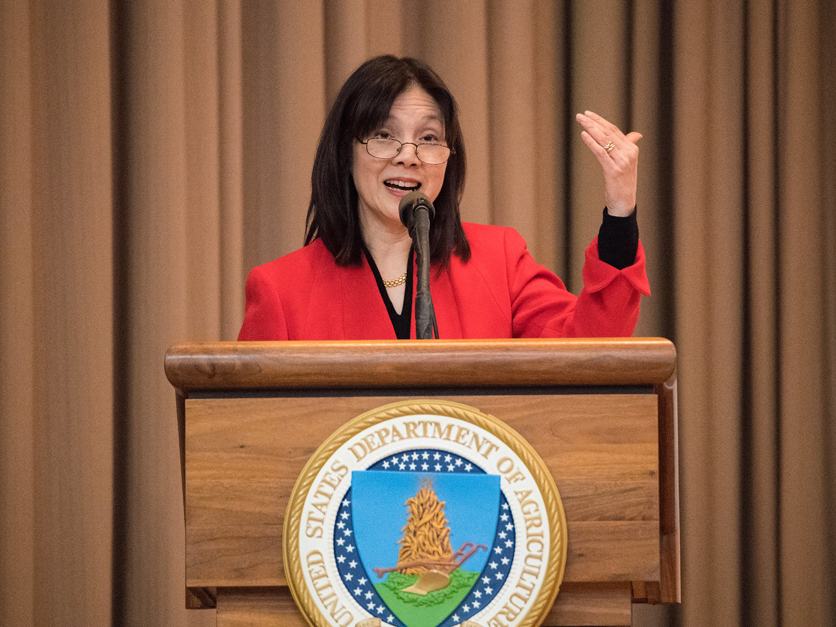The Agriculture Department’s inspector general is undertaking an extended investigation of the administration’s trade assistance programs, starting with whether USDA had the proper legal authority to make direct payments to farmers.
The investigation also will evaluate the design of the Market Facilitation Program as well as questions about eligibility and treatment of producers, Inspector General Phyllis Fong (pictured above) told the House Agriculture Appropriations Subcommittee on Tuesday.
She said auditors also would be selecting a sample of producers for review of their payments.
The Trump administration is spending $28 billion under the 2018 and 2019 programs, mostly for direct MFP payments to producers using Section 5 of its Commodity Credit Corp. authority.
“We are very aware of the large dollars there,” Fong told lawmakers. “It is a priority for our office.”
Democrats on the panel criticized the way the programs were crafted, and Rep. Rosa DeLauro, D-Conn., demanded to know why Fong’s office hadn’t moved more quickly to investigate them.
“Your delay in dealing with this means this program is going to continue to move in the direction it has been moving,” said DeLauro, a leading candidate to chair the full Appropriations Committee in the next Congress should Democrats retain control of the House.
“They can employ the same waste, fraud and abuse which is ongoing right now in this program, and you are not doing anything about it,” said DeLauro.
Agriculture Secretary Sonny Perdue has told farmers not to expect another round of MFP payments for 2020 crops but has not ruled it out. He made similar comments after the 2018 program was announced and told producers not to count on another round of payments in 2019, advice that was voided by President Donald Trump calling for another year of the program.
DeLauro and other Democrats have been particularly critical of USDA for allowing Brazilian-owned JBS USA to benefit from commodity purchases under one of the trade assistance programs the department created with the CCC authority. Two former executives of the parent company, brothers Wesley and Joesley Batista, pleaded guilty to corruption charges and remain shareholders.
Perdue recently denied a request from DeLauro to take steps to kick JBS out of USDA programs. DeLauro cited ongoing Justice Department and Securities and Exchange Commission investigations into JBS practices.
Interested in more coverage and insights? Receive a free month of Agri-Pulse or Agri-Pulse West by clicking here.
“Given that you indicate DOJ and SEC are far down the path with their investigations, then they are fully aware of all potential remedies at their disposal, including an option for suspension and debarment,” Perdue wrote in a Jan. 31 letter to DeLauro.
The top Democrat on the Senate Agriculture Committee, Debbie Stabenow of Michigan, also has complained about JBS’ participation in the program as well as the MFP payment rates. She says they have unfairly favored southern growers.
"The Administration’s trade assistance continues to pick winners and losers between crops. The program almost entirely shut out forest products and specialty crops from receiving direct Market Facilitation Program payments, even though many producers are experiencing trade damage,” according to a report released by Senate Agriculture Committee Democrats.
Questions also have been raised about the payment rates USDA developed for the MFP program. Under the 2019 program, rates were based on a county-by-county estimate of the impact of recent trade disruptions.
USDA hasn't released some key data behind the estimates of trade damage. In a report for the American Enterprise Institute, a free market think tank, former USDA Chief Economist Joe Glauber said "a number of factors suggest that the trade damage estimates the USDA calculated likely substantially overestimated the impact for some US producers (and potentially underestimated the impact on others)."
The inspector general's initial report, which will focus on whether USDA used its CCC authority properly, is expected to be released later this year.
For more news, go to www.Agri-Pulse.com.


